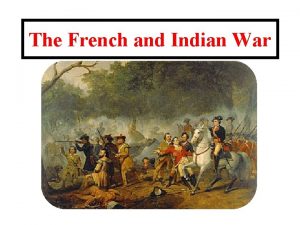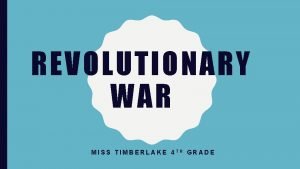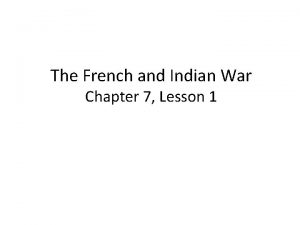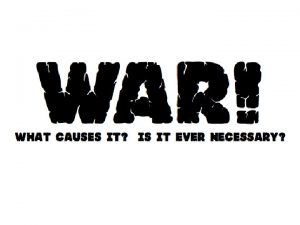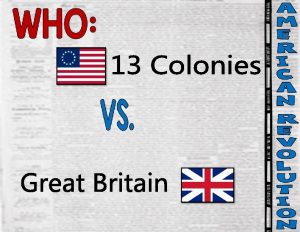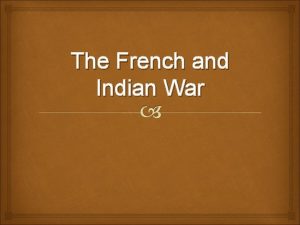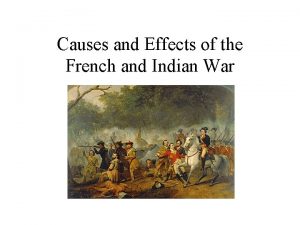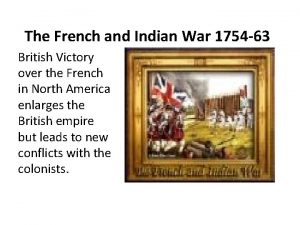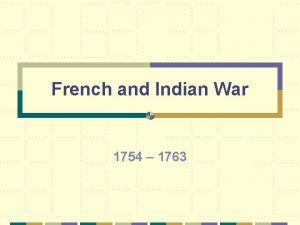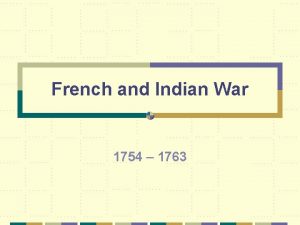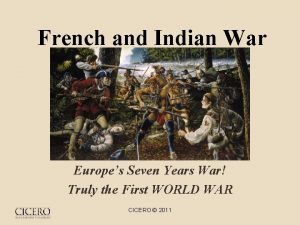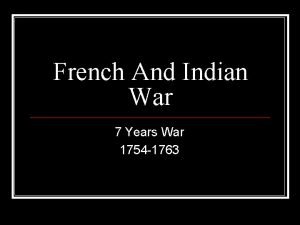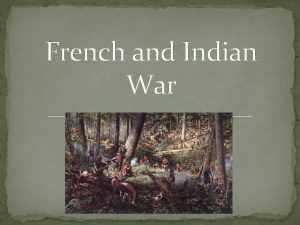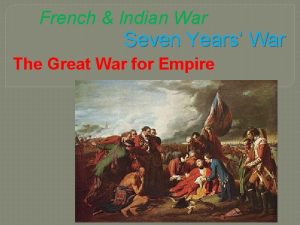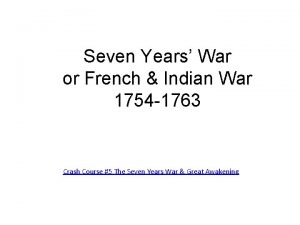The 7 Years War The French Indian War












- Slides: 12

The 7 Years War: The French Indian War – 1756 -1763 Why did the French Indian War have such a great impact on America?

Mercantilism • Economic philosophy or practice in which England established the colonies to provide raw materials to the Mother Country; the colonies received manufactured goods in return. • Government regulation of economy to have a favorable balance of trade. – Key component of this policy - colonies

Conflict Between the French and the English • Competition based on mercantilism • English – settlers, supplying mother country with raw materials • French – trappers and traders, mostly with furs • Native Americans – play the Europeans off each other to be left alone

Start of the War • English settlers desire to move West • Virginia hired Ohio Company Surveying of the land past the Appalachian Mountains – Ohio River Valley • George Washington (1754) – Set up Fort Necessity (western Pennsylvania – destroyed by France) • War fought throughout colonies across the globe – over trade and holdings (India, Africa, Carribean)

Major Battles • Mostly fought in Pennsylvania, New York and Canada • Forts captured – Ticonderoga, Duquesne, Louisberg • Fields of Abraham near Montreal


Colonial Militias • First time Americans from various colonies fought together • Militia volunteers – went home when their tour was over • ". . . he experienced all the evils of insubordination among the troups, perverseness in the militia, inactivity in the officers, disregard of orders, and reluctance in the civil authorities to render a proper support. And what added to his mortification was, that the laws gave him no power to correct these evils, either by enforcing discipline, or compelling the indolent and refractory to their duty". . . "The militia system was suited for only to times of peace. It provided for calling out men to repel invasion; but the powers granted for effecting it were so limited, as to be almost inoperative. ” (Jared Sparks, The Life of George Washington)

Treaty of Paris - 1763 • England gets: Canada and Florida • France gets: Caribbean Islands – Guadalupe and Martinique • Spain gets: Cuba and Phillipines


Native Americans • Most Native Americans allied with the French because they were traders and trappers – not settlers • Iroquois sided with the British • Pontiac’s Rebellion – Native Americans fight against settlers on the frontier

Proclamation of 1763 • No settlement past the Appalachian Mountains – For the British – another war would be too expensive monetarily and militarily • Settlers ignored the Proclamation – For the settlers - rendered their part in the war as insignificant, only reasons fought were for the progress of the British Empire, not for the sake of the colonies

 Causes of french and indian war
Causes of french and indian war French and indian war
French and indian war Brainpop french and indian war
Brainpop french and indian war French and indian war
French and indian war French and indian war summary
French and indian war summary The french and indian war was fought between
The french and indian war was fought between French and indian war
French and indian war British debt after the french and indian war
British debt after the french and indian war Where did the french and indian war take place
Where did the french and indian war take place French and indian war
French and indian war Causes and effects of the french and indian war
Causes and effects of the french and indian war French and indian war
French and indian war French and indian war
French and indian war
